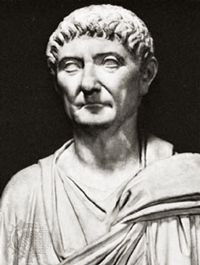Below is a detailed article about the Illyrian rulers in Britain that ruled during the Roman era. The Romans invaded England in 43 AD and continued ruling for the next four hundred years. There were different rulers throughout this period that brought in different changes in Roman Britain in terms of politics, administration, and government. Let us learn about the different rulers below.
Who were the Illyrian Rulers?
The Illyriciani or Illyrian emperors were a group of Roman emperors during the Crisis of the Third Century who were of Illyrian origins and hailed from the region of Illyricum (the modern Western Balkans).
Decius – ruled AD 249–251
Herennius Etruscus – ruled AD 251
Hostilianus – ruled AD 251
Claudius II “Gothicus” – ruled AD 268–270
Quintillus – ruled AD 270
Aurelian – ruled AD 270–275
Probus – ruled AD 276–282
Diocletian – ruled AD 284–305
Maximianus “Herculius” – ruled AD 286–305
Constantius Chlorus – ruled AD 305-306
Galerius – ruled AD 305-311
Constantine I – ruled AD 306–337
Licinius – ruled AD 308-324
Constantius II – ruled AD 337-361
Jovian – ruled AD 363–364
Valentinianus I – ruled AD 364–375
Valens – ruled AD 364–378
Gratian – ruled AD 375–383
Valentinianus II – ruled AD 375–392
Marcian – ruled AD 450–457
Anastasius I – ruled AD 491–518
Justin I – ruled AD 518–527
Justinian I – ruled AD 527-565
Here is information about couple of the rulers.
Emperor Diocletian
Diocletian was born in the Balkan province of Dalmatia. He was an army commander in Moesia in the province of Balkan. He earned many military rankings on his merit. He was also a member of the Illyrian army. He was the imperial bodyguard to Emperor Carus. After all his militarian service and the death of Emperor Numerian, he has proclaimed Emperor of Rome in the year 284 AD by the Senate.

He divided the Roman Empire into two parts for ease in administration. Diocletian spent most of his time in the city of Rome which he was very fond of. He earned the title of Germanicus Maximus after victory over a campaign by him. He also defeated the Sarmatians in Persia and won over in 289 AD.
During his reign, a Roman commander who was in charge of Britain and Northern Gaul proclaimed himself as the emperor of those Roman territories. He was then sent for execution. The divided Empire was better functioning for Diocletian. Similar problems arose in North African Roman Empire and Persia. Again, the Persians were defeated.
In the empire, he reorganized all the tax systems and promoted provincial administration. Most of his appointments were the people that he trusted over people that were more qualified. He is remembered for his constructions of the Roman Baths which are the largest in the world. Diocletian faced the problem of growing Christians in his empire. This was something he did not know how to deal with. The traditional roman gods were being put down and the temples were abolished by the people.
Normally, in Roman culture, the Emperor was also given the title of deity and made a god. This was unacceptable to any of the Christians and the Jews which is why Diocletian could not function as smoothly as the other Emperors. Diocletian’s ego problems posed a great threat. He would ask people to kiss his robe and sanctify him. He wore a crown full of jewels and would sit on an elevated throne in the palace.
In 303 AD, he became extremely ill and 305 AD he was abdicated from the throne as he was in no condition of ruling a large kingdom. He remained in his old palace in Croatia and even asked his joint emperor Maximinus to step down from the throne. He died in the palace in 311 AD. He was succeeded by Constantius Chlorus.
